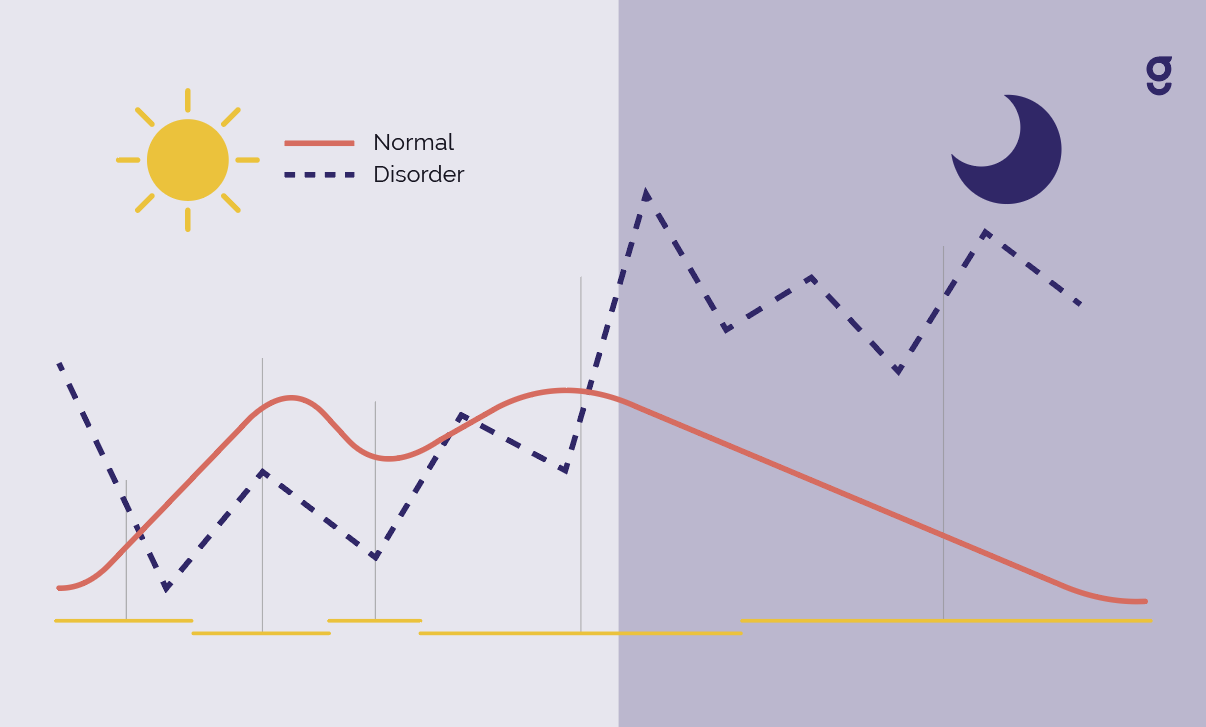What Is a Circadian Rhythm Disorder? Symptoms & Treatment Options

Contents:
What Is A Circadian Rhythm Disorder?
What Are The Symptoms Of Circadian Rhythm Disorder?
How Are Circadian Rhythm Disorders Evaluated?
What Are The Therapies For Circadian Rhythm Disorders?
What Is Circadian Rhythm?
(name=whatis) Circadian rhythm is the body’s internal timekeeper. It is based on the 24-hour light/dark cycle and allows for the alignment of your body processes to the external light-dark environment.
It is reset every day through exposure to light and dark. The circadian rhythm helps you fall asleep and wake up. Additionally, it plays a role in body temperature, digestion, and hormone function. (eg melatonin, cortisol).
What Is A Circadian Rhythm Disorder?
(name=disorder) Situations that alter day-night light exposure may disrupt your circadian rhythms. This may result in a sleep-related disorder, need for additional rest, as well as physical and psychological problems.
The two most common circadian rhythm disorders are shift work disorder and jet lag disorder. There are also several other less common disorders.
Shift Work Disorder
Shift work refers to a work schedule outside of the usual 9:00 to 5:00 workday. It may be regular or irregular nights, early morning work, or rotating days and nights. Shift work disorder is when your work results in sleep problems, as well as trouble with daytime alertness and performance.
1 out 5 jobs in the U.S. involve shift work. Health care professionals and first responders are examples of professions susceptible to shift work disorder. However, shift workers don’t always develop disorders.
Jet Lag Disorder
Jet lag disorder is a short-term disorder due to travel across different time zones. It affects the timing of your sleep-wake cycle when going from one time zone to another. Long distance business travelers and flight attendants and pilots may be affected.
Social Jet Lag Disorder
A related, but much more common disorder, is called social jet lag. Its effects are similar to jet lag disorder, but with a different cause. Although there is no change in time zone, there is a significant change in sleep-wake patterns throughout the week.
Social jet lag is often associated with differences between weekday and weekend sleep schedules. Children in daycare or school may have regular bedtime and wake schedules on weekdays, but with much different weekend or vacation sleep-wake times. Or, with adults, they may have regular work-week sleep and wake times, but with days off or vacations, they stay up longer and sleep late.
What Are The Symptoms Of Circadian Rhythm Disorder?
(name=symptoms) Symptoms of circadian rhythm disorder vary from person to person. They include:
Insomnia or trouble sleeping
Daytime sleepiness and impaired function
Cognitive (thinking) difficulties
Decreased alertness
Poor job/school performance
Physical discomforts, generally feeling unwell
How Are Circadian Rhythm Disorders Evaluated?
(name=diagnosis) The first part of evaluating a circadian rhythm disorder is a review of your medical history and current symptoms, as well as a physical exam. You will usually be asked to complete a sleep diary over a few weeks with the details about your sleep-related habits and patterns. And, you may be asked to wear a wrist device to measure your day/night sleep characteristics (actigraphy).
What Are The Therapies For Circadian Rhythm Disorders?
(name=treatment) Treatment for circadian rhythm disorders include:
Planning for and scheduling sleep
Scheduling light exposure
Melatonin supplements
Stimulants (eg - caffeine)
Prescription sleep medicines
Prescription alerting agents (promote wakefulness)
Circadian rhythm disorders also benefit from supportive family, social, and work environments. Efforts to increase support and decrease stress help in preventing sleep problems and mental health conditions, like anxiety and depression. Additionally, such measures help to improve work productivity which may be a problem in those with shift work disorder.
A circadian rhythm disorder is just one of many types of sleep problems. Goodpath offers customized sleep programs based on individual symptoms and history. The first step? Our free initial assessment, which allows us to find out more about your needs and to provide your personalized program. Start your free sleep assessment today.